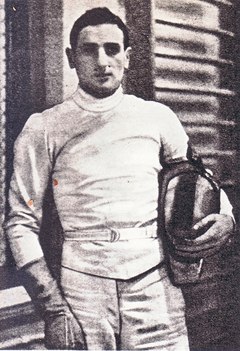Roman Kantor
Roman Józef Kantor (March 15, 1912 – 1943) was a Polish Olympic épée fencer.[1][2]
 | |
| Personal information | |
|---|---|
| Full name | Roman Józef Kantor |
| Born | March 15, 1912 Łódź, Russian Empire |
| Died | 1943 Majdanek, Poland |
| Sport | |
| Country | |
| Sport | Fencing |
Early life
Kantor was born in Łódź, Poland, and was Jewish.[3][4][5] He was the son of Elchanan and Barbara (née Bekier) Kantor. After finishing local primary school, he left for Paris in 1924 to continue his education. He played tennis, and was captain of the school soccer team.
Fencing career
He also started to train in fencing. Shortly after, he received 3rd place in fencing at the academic championship of Paris, and 6th place at the Open Championship of France in 1929.
He then trained in England from 1931–32 under the supervision of fencer Lefevre’a, and in Germany under the supervision of Italian coach Gatzera. In 1934 he returned to Łódź and joined the fencing section of the Army Sport Club, twice winning the team title of City Champion. In 1935 he won the title of Warsaw, and contributed to the Polish victory over Germany.
After receiving 2nd place at the Open Championship of Lvov, he was nominated a member of the Olympic delegation for the XI Olympic Games in Berlin in 1936. There, at the age of 24, he won seven bouts in the quarterfinals (defeating eventual silver medal winner Saverio Ragno) and four in the semifinals (defeating eventual gold medal winner Franco Riccardi), but did not get to the finals.[6] He did, however, contributed to receiving an 8th spot finish by the Polish team.[7][6]
In December 1936 he moved to Łódzki Klub Sportowy. He was twice champion of the city, both in individual and team fencing (1938 and 1939). He won the Nordic countries championship in 1938, and received a 2nd place in 1939 in the last Championship of Poland before the outbreak of World War II. On May 14, 1939, he took the Olympic oath with other Łódź Olympians before the planned 1940 12th Summer Olympic Games.
When the Germans took over Poland, however, he escaped to Lvov, where in 1940, in Kharkiv, he won the Championship of the Soviet Union.
Concentration camp and death
When Lwów was taken over by the Germans, to escape the Nazis because he was Jewish, he obtained a passport and citizenship of a South American country, and waited for the German authorities' permit to leave for a neutral country. In this time, he lived in a building at Sapieha Street. It turned out that the Germans were misleading the inhabitants of the building, and they were all later arrested and transported in 1942 to the Majdanek concentration camp and killing center.[8] There, Kantor was forced to do work for Ostindustrie, and was mentioned in the 1943 register of prisoners.[9]
He died there in 1943.[10] The Jewish Polish swimmer Ilja Szrajbman, who had also participated in the 1936 Berlin Olympics, was also killed by the Nazis that year.[1][7] Kantor was one of approximately 3 million Polish Jews murdered during the Holocaust.[11]
See also
Notes
- Ezra Mendelsohn (2009). Jews and the Sporting Life: Studies in Contemporary Jewry XXIII. pg 25: Oxford University Press US. p. 384. ISBN 0-19-538291-9.CS1 maint: location (link)
- "Roman Kantor Olympic Results". sports-reference.com. Archived from the original on April 17, 2020. Retrieved June 5, 2010.
- The Olympics at the Millennium: Power, Politics, and the Games
- Jews and the Olympic Games: the clash between sport and politics : with a ... - Paul Taylor
- Jews and the Olympic Games: sport: a springboard for minorities - Paul Yogi Mayer
- Roman Kantor Bio, Stats, and Results | Olympics at Sports-Reference.com
- Kay Schaffer; Sidonie Smith (2000). The Olympics at the Millennium. pg 58: Rutgers University Press. ISBN 0-8135-2820-8.CS1 maint: location (link)
- Doorway to Freedom: The Story of David Kaufmann, Merchant, Benefactor, Rescuer - William E. Ramsey, Betty Dineen Shrier
- Paul Taylor (2004). Jews and the Olympic Games: the clash between sport and politics : with a complete review of Jewish Olympic medallists. pg 106: Sussex Academic Press. p. 268. ISBN 1-903900-87-5.CS1 maint: location (link)
- "Olympians Who Were Killed or Missing in Action or Died as a Result of War". Sports Reference. Archived from the original on 17 April 2020. Retrieved 24 July 2018.
External links
- Kay Schaffer, Sidonie Smith (2000). The Olympics at the Millennium. Rutgers University Press. ISBN 0-8135-2820-8.
- "The Olympics and the Holocaust," 2004 at Archive.today (archived 2013-04-16)
- Holocaust Museum bio
- Dictionary of Lodz Jews at the Wayback Machine (archived October 28, 2006)
- "The Nazi Olympics" at the Wayback Machine (archived February 26, 2002)